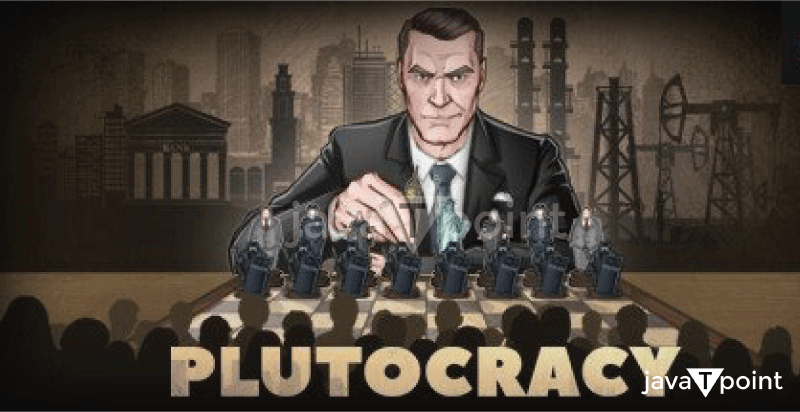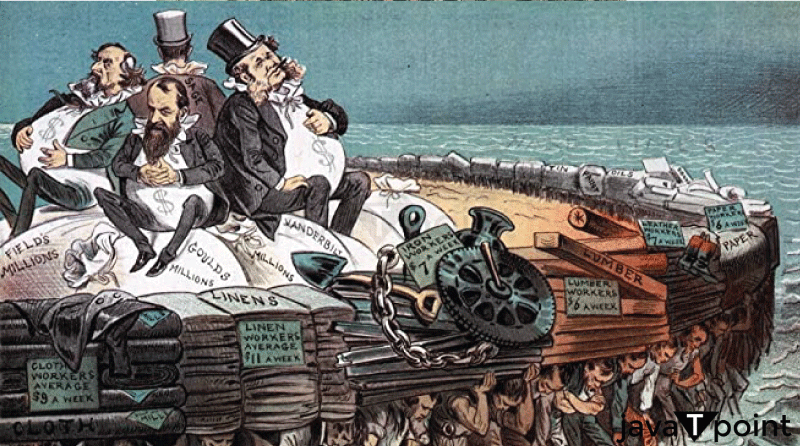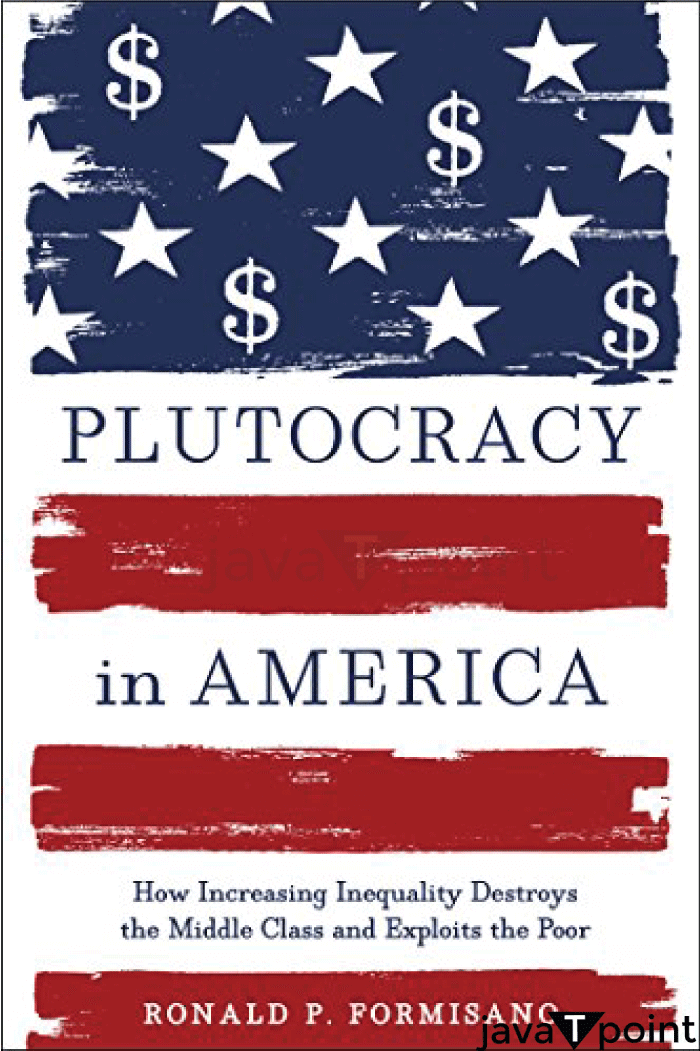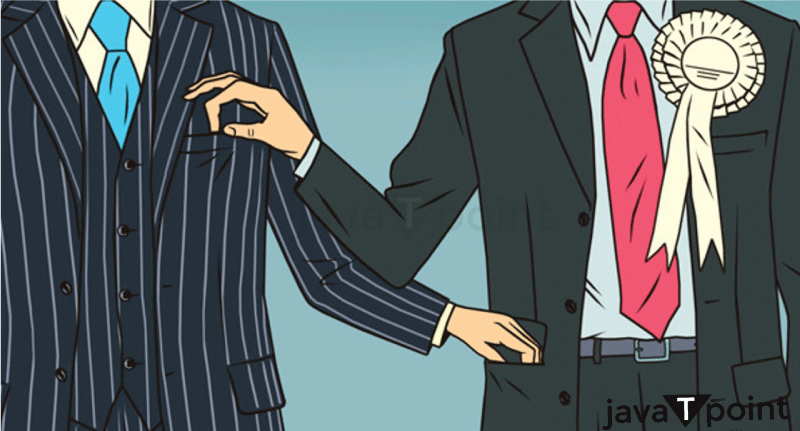Plutocracy DefinitionAn all-wealthy administration, whether directly or tangentially, is known as a plutocracy. In a plutocracy, only the rich can hold power publicly or through nature's force. This can lead to policies that are only intended to help the affluent, which is evident in the name of the movement-the Greek terms "Ploutos" and "Kratos" mean, respectively, "wealthy" and "power or ruling" in English. 
"Plutocracy" is typically used pejoratively to denote or forewarn about a bad situation. Political theorists and philosophers have denounced plutocrats throughout history for ignoring their social obligations, abusing their position of authority to further their interests, fostering class warfare, and defiling society with avarice and hedonism. Understanding Plutocracy
Plutocracy need not be a deliberate, overt type of rule. Instead, it can be made by giving wealthy people exclusive access to certain programs and training tools, increasing their power. The danger of unintentionally establishing a plutocracy lies in the limited legislative focus that will be placed on the objectives of the affluent, which will exacerbate income and asset-based disparity. In a plutocracy, obtaining political authority is difficult and necessitates having wealth or having the backing of the wealthy by agreeing to advance their agenda. According to official rules and regulations, individuals may need to meet certain financial requirements to wield political power, such as voting or holding public office. However, plutocracy more frequently develops covertly and is tacitly reflected in legal, regulatory, or constitutional provisions that erect obstacles to political involvement that can only be overcome by the ownership or use of sizable wealth. In a plutocracy, laws passed and implemented typically help the rich directly or indirectly. The precise substance of government policies may differ significantly based on regional and past economic, political, and social circumstances. Nevertheless, they set in motion economic processes and practical repercussions that serve the interests of the wealthy, even though they rarely manifest themselves in the form of explicit policies that publicly benefit the wealthy as a stated policy objective. For instance, even though most modern nations claim to be republics, in reality, political campaigns and policymaking depend heavily on the contributions of affluent individuals. The majority or all of the public policy is determined by the money rich people and businesses spend on political campaigns, legal advocacy, "socially aware" action, and rarely direct bribes. Because they possess the majority of the money and dominate the highest levels of economics and finance, a relatively tiny part of the population can influence public opinion and public policy in ways that are beneficial to them. Such policies are usually never advertised as directly favoring the interests of the affluent; instead, they typically hide behind another purpose of public policy that appears legitimate and inadvertently serves to advance or protect the interests of the wealthy. These purported arguments could include everything from defending the nation's security to advancing public health. They may increasingly even be committed in the name of justice, equality, and ending historical injustices. In a plutocracy, public policies that benefit the wealthy frequently do so not by directly advancing their interests but by undermining those of the middle class and small businesses, giving the wealthy a more secure competitive position in day-to-day business, investment activity and financial markets. Examples of such policies include entry-barrier laws (or regulations that act as barriers), free-market reforms that benefit wealthy people and large corporations, or public awareness and education campaigns that shift the focus of public attention away from the wealthy and towards other groups of the population that can be used as scapegoats for various injustices and inequalities. Plutocracy vs. OligarchyA governmental system known as an oligarchy is one in which control is vested in a limited number of individuals. This collection of individuals need not necessarily be wealthy, unlike a plutocracy. An oligarchy, for instance, might be ruled by the military, a central council of communist revolutionaries, or even a technocracy. Only when an oligarchy is confined to a select few rich people can it also be called a plutocracy? Only the wealthy control the government in a plutocracy. The plutocrats are extremely wealthy people who use their riches to sway elected officials through legal and criminal tactics, such as lobbying, bribery, and significant election campaign contributions. They are not necessarily members of the government. Both plutocracies and oligarchies speak for a self-centered segment of society. Because of this, both expressions are frequently used negatively to convey the concern that a minority in power will put its interests and goals before those of the nation. Under that situation, both oligarchies and plutocracies are more prone to subject the populace to oppression and prejudice. Examples of PlutocracyPlutocracy has existed since the beginning of existence. The Roman Empire was viewed as a type of plutocracy where a Senate of the rich nobility had the authority to choose local government officials and make new policy proposals. Due to the wealthy's disproportionately large impact on the country's election and policymaking processes, America is now viewed as an example of a country with aspects of plutocracy, as discussed above. America was significantly impacted by a tiny number of New York City-based plutocrats in the early 1900s. The Pujo Commission ultimately looked into this. Some of these people, who are now well-known, included robber barons and business moguls like J.P. Morgan, William and John D. Rockefeller, and others who practically held a stranglehold over the American banking system. Plutocracy CharacteristicsAny government's distinctive qualities are its traits. Plutocracies have unique traits. Some aspects of plutocracy's political structure are advantageous, while others are not. These advantages contribute to any country's growth, whereas plutocracy's drawbacks can impair its ability to operate. Any country must surmount these drawbacks to function effectively. By researching the plutocracy's benefits, drawbacks, and framework, it is now simpler to understand its characteristics. The elements that define a plutocracy's structure, benefits, and drawbacks include class conflict, corruption, greed, self-centeredness, ignoring societal obligations, productive investment, and social spending. In studying this type of government, the plutocracy's framework is also crucial because it provides insight into how the government runs. Other aspects of a particular form of administration also contribute to the explanation. Get the traits of a plutocracy right now, along with the definition, history, and countries with a plutocracy. These characteristics perfectly sum up this official document. Plutocracy in the U.S.
President Theodore Roosevelt's autobiography states, "Of all types of tyranny, the tyranny of simple riches, the tyranny of a plutocracy, is the least attractive and the most vulgar." When Roosevelt wrote this, the wealthy could buy vacation mansions in Newport that made the White House look run-down and paid little or no income tax. Even though wealth inequality in the United States is a topic of much discussion, plutocracy is more of a basic idea than a formal governmental paradigm in any modern nation. David Korten, an author and former professor at Harvard Business School, asserts that the phrase "describes our position in the United States significantly more precisely than the term democracy. Since our inception, we have been an Empire governed by a plutocracy. In a study, professors Martin Gilens of Princeton University and Benjamin I. Page of Northwestern University concluded that "multivariate analysis appears to indicate that wealthy elites and organized groups chosen to represent corporate interests have depended solely on impacts on U.S. government policy, whereas regular people and mass-based special interests have little or no influential effect." Others have reached the same conclusions. Professors of political science Thomas Hayes and Lyle Scruggs at the University of Connecticut found in 2017 that the concentration of state incomes with a small number of people results in a rapid decline in social welfare programs. They claim that "representation in America may have deviated pretty far from the ideal of one-person, one-vote in recent years" because "wealth concentration at the top has become so lopsided, and politicians have become so dependent on their support for reelection." Countries with PlutocracyOne of the most well-known instances of plutocracy is Venice. The plutocratic system existed in commercial city-states like Florence, Genoa, and others. Before World War II, the Dutch Republic, the Japanese Empire, the Roman Empire, and a few Greek towns had plutocracies. The square mile metropolis of London is said to have a unique electoral process for choosing its municipal officials. Local companies use most of the services the City of London Council offers. Non-residents make up more than two-thirds of the electorate. They are delegates from different organizations and companies with a foothold in the city. Plutocracy in the U.S. CongressPlutocracy seems to be a well-established and escalating trend in the United States Congress. According to Roll Call, the 115th Congress's (2017-2019) total wealth was at least $2.43 billion, or 20% greater than the previous Congress's total wealth. Meanwhile, the Center for Responsive Politics estimated net worth calculations show that more than half of the 116th Congress members are millionaires (2019-2021). CausationComplex factors play a role in plutocracies' emergence. Income inequality tends to rise as the rate of return on invention rises in a country with rapid economic development. In other cases, a nation may fall into a plutocracy due to resource depletion as the ruling class tries to hoard the dwindling wealth or increase debts to maintain security, which will usually benefit debtors and investors. Due to the higher effectiveness of bigger companies, economists have also proposed that free market economies have the propensity to develop into monopolies and oligopolies. Plutocracy Advantages and Disadvantages
Each type of government has its benefits and drawbacks. The fundamental traits of a plutocracy include a wide range of benefits and drawbacks. These advantages and disadvantages greatly impact the nation. All these variables affect a country's socioeconomic stability. Several benefits of plutocracy aid in the establishment and development of the system. Investment in productivity and social spending. The drawbacks hinder a country's progress. The following list of disadvantages of plutocracy is more detailed: Class division, corruption, greed, self-centered goals, and a disregard for social obligations Key Takeaways
FAQ'sQ.1 What Characteristics Define a Plutocracy? Ans. The fundamental element of this sort of society is ruled by the wealthy. However, a plutocratic government differs from others in that a power transfer may occur when one segment becomes rich. Q.2 What Benefits Does Plutocracy Offer? Ans. Even though history has shown that plutocracy is an unjust system for most of society, it initially has some benefits. Initially, plutocratic regimes are more effective and efficient because they have access to financial means. Economic development can be motivated by money because money is an incentive. Q.3 How is a Plutocracy Structured? Ans. Government-run by plutocrats is responsive to the needs of the affluent. They impact how decisions are made and policies are developed in the nation, ideally serving their interests. Most of the system operates through force, corruption, and changing the rules and regulations to fit their purposes. ConclusionPlutocracy is a fairly prevalent type of government, even in places where the formal model of government is democratic, because of the self-reinforcing cycle of wealth, access to political power, and public policy's effect on society's economic ties.
Next TopicRule 10b-6
|
 For Videos Join Our Youtube Channel: Join Now
For Videos Join Our Youtube Channel: Join Now
Feedback
- Send your Feedback to [email protected]
Help Others, Please Share









